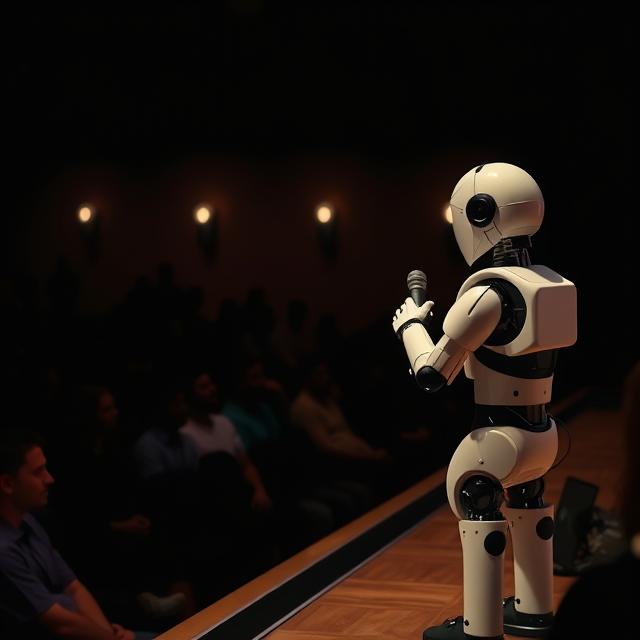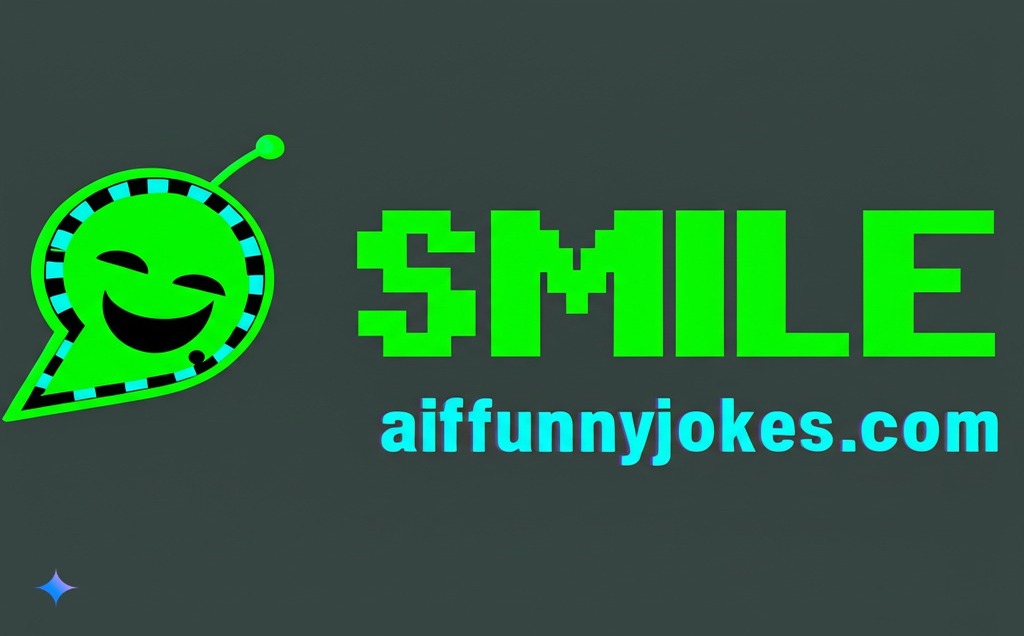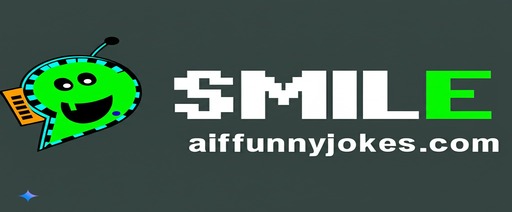
An AI standup comedy routine generator can help comedians create jokes and build routines, but it won’t replace human performers anytime soon. These tools work best as creative assistants rather than autonomous joke machines, helping with writer’s block, suggesting unexpected premises, and offering alternative punchlines – all while leaving the authentic human touch that makes great comedy resonate.
Hey there! Remember when comics had to rely solely on their own brains to come up with material? Those days are fading faster than a comedian’s self-esteem after bombing at an open mic. Today’s world of comedy is getting a technological upgrade with artificial intelligence comedy writing tools that are changing how jokes get made.
But can a computer really understand what makes people laugh? Let’s dive into how these digital joke machines work, what they’re good at, what they’re terrible at, and whether your favorite comedian might secretly be getting help from an algorithm.

How AI Standup Comedy Routine Generators Actually Work
The technology behind an AI standup comedy routine generator is pretty fascinating. These systems aren’t just random joke dispensers – they’re sophisticated tools built on:
- Massive datasets of existing comedy content
- Natural language processing algorithms
- Pattern recognition systems that identify joke structures
- Machine learning models trained to understand humor mechanics
Think of them as comedy students that have watched thousands of hours of standup and read millions of jokes. They’ve learned the patterns but lack the lived experience that informs great comedy.
Most machine learning joke generators follow these basic steps:
- Analyze vast amounts of comedy material to learn structures
- Identify common patterns in successful jokes
- Generate new content following those patterns
- Refine outputs based on feedback
The more advanced systems can even tailor content to specific comedy styles or audience demographics. As one developer explained: “We’re not teaching AI to be funny – we’re teaching it to recognize and replicate the patterns that humans find funny. There’s a subtle but important difference.”
Here’s my original joke about this process:
“My friend built an AI comedy writer and fed it 10,000 dad jokes. Now it won’t stop making pun suggestions and asking if I’ve checked the thermostat. It’s not just generating jokes – it’s developing a receding digital hairline.”
The Technical Magic Behind the Jokes
Current AI standup comedy routine generators rely heavily on what tech folks call natural language processing (NLP) and neural networks. Without getting too technical, these systems:
- Break down existing jokes to understand their components
- Analyze why certain structures trigger laughter
- Learn to recognize setup-punchline patterns
- Develop models for subverting expectations (a key humor component)
As research into computational humor shows, the technology has improved dramatically in recent years. Modern systems can now understand:
- Wordplay and puns
- Basic irony and sarcasm
- Cultural references (within limits)
- Comedic timing through sentence structure
If you’re curious about how these systems compare to human joke-telling, check out these short funny jokes about AI that showcase both the progress and limitations of machine humor.
However, they still struggle with many elements that make human comedy special – more on that shortly.
What AI Comedy Tools Do Well (And Poorly)
Let’s be honest about where stand-up routine creation with AI shines and where it falls flat.
Strengths of AI Comedy Generators:
- Endless ideation: They never run out of ideas or get writer’s block
- Pattern mastery: They excel at structured joke formats
- Rapid production: They can generate hundreds of joke options in seconds
- Objectivity: They don’t get attached to mediocre jokes because of personal bias
A comedian I spoke with said: “The AI is like having a tireless brainstorming partner who doesn’t get hungry, tired, or offended when you hate their ideas.”
Weaknesses That Keep Humans Employed:
- Lack of lived experience: They haven’t experienced embarrassment, love, or family holidays
- Cultural tone-deafness: They struggle with nuanced social boundaries
- Authenticity gap: They can’t provide genuine personal perspectives
- Delivery limitations: They don’t understand physical comedy or vocal timing
My original joke about these limitations:
“I asked an AI to write me a joke about my first date experience. It wrote: ‘Dating is hard, like when your central processing unit overheats during an awkward silence.’ I don’t think it’s been on many second dates.”
Real Comedians Using AI Tools: Case Studies
Let’s look at how actual comedians are incorporating AI standup comedy routine generators into their creative process.
Professional Comic Experimentation
In 2023, a study involving 20 professional comedians revealed fascinating insights about comedians using technology. These professionals used AI tools to help with their writing process and reported:
- AI was most useful for overcoming writer’s block
- The best results came from using AI suggestions as starting points
- Complete AI-generated routines lacked personality and coherence
- The most successful approach was human-AI collaboration
One participant described the AI output as a “vomit draft” that required significant human refinement – not exactly a glowing endorsement, but an acknowledgment of its utility as a starting point.
For a hilarious look at what happens when AI joke-writing goes wrong, check out these funniest AI joke fails that show even smart machines can be accidentally funny for the wrong reasons.
Stand-up Integration Success Stories
Several comedians have successfully integrated AI tools into their creative process. For example, Dante Chapman’s approach demonstrates how AI can enhance creativity without taking over the process. His method focuses on:
- Using AI for initial brainstorming of premises
- Having the technology generate multiple punchline options
- Selecting and heavily modifying the output to match personal style
- Adding personal anecdotes and delivery elements AI can’t replicate
Through this collaborative approach, Chapman and others have found a balance between technological assistance and authentic human comedy.
The Amateur Comedian’s New Friend
For newcomers to comedy, automated joke writing tools can be particularly valuable:
- They help understand basic joke structures
- They provide templates to practice with
- They generate practice material for delivery work
- They offer alternatives when beginners get stuck
Several open mic performers I spoke with use AI tools for “comedy training wheels” – getting comfortable with structure while developing their unique voice.
“It’s like having a comedy coach available 24/7,” one beginner told me. “The AI gives me formats to work with, then I fill in my personal experiences to make them authentic.”

The Ethics of AI-Generated Comedy
The rise of AI standup comedy routine generators raises important ethical issues in digital humor:
Originality and Plagiarism Concerns
Since AI systems learn from existing comedy:
- They may inadvertently recreate existing jokes
- The line between inspiration and copying becomes blurred
- Attribution becomes nearly impossible to track
- Intellectual property questions multiply
Some comics worry about an AI trained on their specific style generating similar content without compensation or credit.
Authenticity and Connection
Comedy often works because of the authentic human connection. When audiences discover material was AI-generated:
- The perceived authenticity can diminish
- The emotional connection may weaken
- The comedian’s credibility could suffer
- The shared human experience that drives comedy is compromised
My original joke illustrating this concern:
“I told a joke that my AI assistant helped write. It got huge laughs, but afterward someone asked if it was AI-generated. I felt like I’d been caught lip-syncing at a concert. AI doesn’t just write jokes – it creates comedians with imposter syndrome.”
This issue leads to the philosophical question that many are debating: can AI be funnier than humans? The answer depends on how we define and value authenticity in comedy.
Disclosure Debates
Should comedians disclose when they use punchline generation software? Opinions vary wildly:
- Some argue complete transparency is essential
- Others view AI as just another writing tool that doesn’t require disclosure
- Some propose a middle ground where significant AI contributions are acknowledged
- Many worry audiences will prejudge AI-assisted material
As explored in this ethics case study, the controversy surrounding AI-generated content in George Carlin’s style raised significant questions about attribution, authenticity, and respect for a comedian’s legacy. These same questions apply to living comedians using AI assistance.
This ethical question remains unresolved in the comedy community, with various platforms developing their own guidelines for how AI-generated comedy should be labeled and attributed.
A Step-by-Step Guide to Using AI Comedy Tools
Curious about trying an AI standup comedy routine generator yourself? Here’s a process many comedians follow:
- Start with a premise: Give the AI a topic or concept to work with
- Generate variations: Create multiple options and approaches
- Select promising ideas: Identify kernels with potential
- Add personal touches: Inject your experiences and perspective
- Rewrite in your voice: Make sure it sounds like you
- Test and refine: Try it out and keep improving
The key is using the AI as a collaborator, not a replacement for your own creativity. As one comic put it: “Let the AI handle the boring parts of joke writing so you can focus on making it unique to you.”
The Best AI Comedy Tools Available Today
Several digital comedy tools have emerged as leaders in this space, as detailed in this comprehensive guide.
Commercial AI Comedy Assistants
- JokeGPT: Specialized in one-liners and short-form comedy
- StandUpAI: Focuses on full routine development with structure
- PunchlinePro: Offers style customization based on famous comedians
- HumorizeAI: Provides feedback on joke effectiveness and suggestions
For inspiration on how these tools might help with specific comedy styles, check out these profession-specific humor examples that show how different occupational contexts create unique comedic opportunities.
Case Study: WriteCream’s Punchline Generator
WriteCream’s AI comedy tool has been used by aspiring comedians to craft punchlines tailored to specific topics. Its ability to generate multiple options allows users to refine their material quickly. For example, a user inputting “dating struggles” received punchlines ranging from sarcastic quips to absurd humor, which they polished into a successful routine.
What makes this tool particularly effective is its ability to generate multiple punchlines or full routines based on learned patterns, giving comedians plenty of options to choose from.

Case Study: Dante Chapman’s AI Integration
Comedian Dante Chapman has demonstrated how AI tools can enhance creativity by generating fresh ideas for routines. His book provides practical insights into blending AI-generated material with personal comedic voice, showcasing how technology can complement human creativity without overshadowing it.
The key insight from Chapman’s work is the importance of customization: adapting AI-generated jokes to fit individual comedic styles rather than using them verbatim.
Case Study: Rytr’s Role in Live Performances
Rytr has been praised for helping comedians develop routines that resonate with live audiences. One performer used Rytr to brainstorm jokes about modern technology, resulting in a set that received positive feedback for its relatability and wit.
DIY Approaches
Many comedians create custom solutions using:
- Prompt engineering with general AI models
- Fine-tuning existing models on comedy databases
- Creating specialized systems for their particular style
- Building feedback loops based on audience reactions
For those interested in exploring these tools, numerous resources are available to help get started. If you’re looking for examples of simpler humor formats that AI excels at generating, these classic joke formats provide excellent templates.
The Future of AI in Standup Comedy
Where is the AI standup comedy routine generator technology headed? Industry experts predict:
Near-Future Developments
- More specialized tools for different comedy styles
- Better understanding of cultural contexts and sensitivities
- Improved personalization based on a comedian’s existing material
- Interactive systems that can workshop ideas in conversation
Long-Term Possibilities
- AI systems that can help with physical delivery and timing
- Virtual reality comedy writing environments
- Real-time audience analysis to gauge joke effectiveness
- Fully autonomous AI comedy performers (though likely as novelties)
My joke about this future:
“They say in the future, AI comedians will perform on stage. They’ll have one big advantage – when they bomb, they can just blame it on a software update. ‘Sorry folks, I’m still running Comedy OS 2.0. The punchline module is experiencing technical difficulties.'”
How Comedians Can Stay Relevant in the AI Age
For human comics worried about artificial intelligence comedy writing taking their jobs, here’s some reassurance:
Focus on What AI Can’t Replicate
- Personal experiences: Your unique life story cannot be generated
- Authentic reactions: Real-time crowd work and improvisation
- Physical comedy: Your embodied presence and movements
- Community connection: Understanding the specific audience in the room
Embrace AI as a Collaborator
The most successful comedians will likely:
- Use AI for idea generation and brainstorming
- Let algorithms handle structured joke formatting
- Employ virtual comedy coaching for technique
- Leverage technology while maintaining their unique voice
As one comedian told me: “I’m not afraid of AI writing jokes. I’m using it to handle the grunt work so I can focus on being more creative, not less.”
Develop Complementary Skills
Smart comedians are investing in abilities that complement AI capabilities:
- Stronger stage presence and delivery
- More authentic and vulnerable material
- Better crowd interaction techniques
- Unique perspective development
Conclusion: Human-AI Comedy Partnerships
As we’ve seen, the AI standup comedy routine generator isn’t replacing comedians – it’s transforming how they work. The most exciting possibilities lie not in AI or humans working separately, but in thoughtful collaboration between the two.
The future of comedy likely includes:
- Human comedians with AI writing assistants
- More prolific output from top performers
- Increased experimentation with formats and styles
- New forms of comedy we haven’t even imagined yet
What makes us laugh most deeply will always be connected to our shared human experience – something no algorithm can fully replicate. But by embracing these new tools, comedians can focus more on that human connection while letting AI handle some of the mechanical aspects of joke construction.
So next time you’re laughing at a standup special, remember – there might be a silicon assistant who deserves a tiny bit of credit for that punchline. But the heart and soul of great comedy? That remains gloriously, messily human.
I’d love to hear your thoughts! Have you tried using an AI standup comedy routine generator? Would you be bothered knowing your favorite comedian gets technological help? Drop a comment below!
FAQ: AI Standup Comedy Routine Generators
How does an AI standup comedy routine generator work?
It analyzes thousands of jokes to learn patterns, then generates new content following similar structures while substituting new topics and punchlines. The most effective systems use neural networks and natural language processing to understand humor mechanics.
Can machines write funny jokes like humans?
They can write jokes that follow correct comedy structure, but they often lack the authentic perspective and emotional intelligence that makes great human comedy resonate. They’re better at generating options than creating finished, polished material.
Do professional comedians actually use these tools?
Yes, increasingly. Many use them for brainstorming, overcoming writer’s block, or generating alternative punchlines. However, most heavily modify the AI output to fit their personal style and experiences.
Are there ethical concerns about using AI for comedy writing?
Absolutely. Issues include potential plagiarism (since AI learns from existing content), questions about disclosure to audiences, and debates about authenticity in an art form that traditionally values personal truth.
Will comedy written by AI eventually be indistinguishable from human comedy?
For simple joke formats, we’re already close. For full standup routines with consistent perspective, authentic experiences, and masterful delivery, humans will maintain an edge for the foreseeable future.
What’s the best tool for writing stand-up routines with artificial intelligence?
The “best” tool depends on your specific needs and style. Some focus on one-liners, others on longer narrative comedy. Most professionals use a combination of tools rather than relying on a single system.
How much does an AI comedy assistant cost?
Prices range from free (basic tools with limitations) to subscription services costing $20-100 monthly for professional-grade assistants with advanced features and regular updates.
Do audiences know when jokes are AI-generated?
Sometimes. AI-generated content often has subtle “tells” like unusual word choices or slightly off cultural references. However, when heavily edited by humans, these become nearly impossible to detect.

